2023 Yamaha Tracer 9 GT+ Review – First Ride
Yamaha’s sports tourer middleweight receives an influx of technology for 2023
Astute readers are probably wondering why Motorcycle.com is publishing a First Ride of a bike that’s not coming to the States this model year. Our reasoning is that, thanks to the sleuthing of Dennis Chung, we suspect the Yamaha Tracer 9 GT+ will be coming to the U.S. in 2024. (Read about it here.) So, we thought our fellow MOrons might be as interested as we are in how well the new technology incorporated into the GT+ performs. We hope you enjoy this taste of what it has to offer. –EB
Yamaha’s highly acclaimed Tracer 9 GT sports tourer was launched back in 2021 during the pandemic and, unfortunately, I missed the opportunity to throw a leg over the new model. However, everyone I spoke to who had ridden the GT rated it very highly, so I had high expectations of the new 2023 Tracer 9 GT+, which gains a huge dollop of whizzy new tech plus some smart updates.
The headline developments are the introduction of Radar-Linked Unified Braking System, a world first, and, for the first time on a Yamaha, – hence the large radar at the front. But that’s not all: A new 7-inch TFT display, slick new switchgear, a larger rear disc (for the new braking system), a new seat design, and a third-generation quick-shifter all debut on the 890cc Triple.
2023 Yamaha Tracer 9 GT+
Although Yamaha doesn’t see fit to bring the Tracer GT+ into the U.S., the 2023 upgrade has added tremendous value to an already great package.
Highs
- The world’s first Radar-Linked Unified Braking System
- Adaptive Cruise Control
- Third-generation quickshifter improves gear changes
Sighs
- Not coming to the U.S. market... yet
- No changes to the 890cc CP3 Triple
- Semi-active suspension can take away some rider feel
Yamaha treated us to a full day in the saddle, including some motorway miles, enabling us to test the new Adaptive Cruise Control around the stunning island of Sardinia.
Yamaha has left the excellent, charismatic 890cc CP3 Triple alone. That means the same claimed peak of 117bhp as before with the same 68.5 ft-lb peak torque figure, too (we measured the 2021 model with 105.8 hp at 9,900 rpm and 62.8 lb-ft at 7,000 rpm on the dyno). A third-generation, bi-directional quick-shifter that allows you to downshift with the throttle still open is added, meaning you can knock back a few gears – to third or even second – without closing the throttle. The system is smooth and effortless.
For me the Tracer’s power and delivery are close to perfect; strong but not too fierce with a lovely spread of torque, plus a sweetly tuned roar when you grab a handful of throttle.
Like the motor, the suspension also remains unchanged and retains semi-active KYB units front and rear. This was my first time on a Tracer with semi-active suspension, and it didn’t disappoint. In many ways, it really shouldn’t handle as well as it does – this is a middle-weight sports tourer after all – but flick into Sports mode, and the suspension and chassis deliver a wonderfully exciting ride.
With some semi-active suspension systems, crucial rider feeling is taken away, but feedback from the KYB set-up is excellent for this type of bike. I rode it fast and slow; smoothly and aggressively, and had undistracted fun on the outstanding roads of Sardinia throughout. The new GT+ is hard to fault.
The Bridgestone T32 tires warm up quickly and offer great grip and only enhance the Tracer's intrinsic feedback. Yes, there are limitations to the sporty side of this sports tourer: the pegs will eventually touch in the softer, more compliant Street or Rain modes, especially with a heavyweight rider onboard, but in Sport mode the GT+ was as accurate and almost as happy to carry corner speed as its naked MT-09 sibling.
So, the new Tracer 9 GT+ is fun, sounds great, has plenty of grunt and handles, which, aside from the new quick-shifter, makes its sportier side much like that of the excellent Tracer 9 GT (the one without the "+").
However, with the GT+, Yamaha has installed radar technology for the first time, which brings Adaptive Cruise Control (ACC) and the world’s first Radar Linked Unified Braking system. Eager to demonstrate its new tech, Yamaha treated us to a decent motorway blast to test both systems as well as the functionality of the new 7-inch TFT dash and switchgear (which loses the unloved "Yamaha wheel" from the right bar and, hopefully, places it in the bin).
The ACC works by maintaining a selected gap of approximately one to two seconds between you and other traffic users, increasing or decreasing the GT+'s speed as required, automatically utilising engine braking or activating the brakes, if required.
The ACC takes data from the IMU and adjusts its response to a changing gap depending on the GT+'s degree of lean angle. Additionally, as the suspension is semi-active, when the ACC accelerates or decelerates it adjusts the suspension settings to reduce pitch or squat to maintain stability – all this on a sub-£15k bike.
On the move, you can increase or decrease the distance between you and other road users on the fly, which is useful in the wet, especially. You can also increase your speed in 1km or 10km increments and there is even the very clever Passing Assist, which smooths the GT+'s acceleration when you indicate from lane two to three and the radar can see the road ahead is clear.
I’ve tested similar radar systems before and this new Yamaha system is one of the best. It’s easy to understand and use, while the new color dash and new switchgear enable intuitive navigation. Once you’ve experienced the system, it becomes both addictive and second nature, helping to make long-haul touring effortless and less fatiguing. In theory, you should arrive at those distant twisty mountain passes bursting with energy.
Sadly (or not) I didn’t get the opportunity to try the world’s first Radar-Linked Unified Braking System, despite trying. The system acts as a backup to the lean-sensitive ABS, using information from the radar to optimise very hard braking.
Put very simply: A cow wanders unexpectedly into the road and you, the GT+ rider, obviously apply the brakes as hard as you dare. The new system can see you are approaching an object (the cow) at speed, via the radar. The system is also receiving masses of other data it knows is critical stuff, like brake pressure, wheel speeds, fork dive, lean angle, and even how much grip the bike has (has the ABS chimed in yet?). Within a fraction of a second it calculates if it can assist and whether the GT+ can brake more to avoid a collision.
If you’re applying 50% brake pressure the system might add another 10% as it knows all the parameters and knows by taking data from all the rider aids, like cornering ABS, how much harder the brakes can be used. The system only activates in an emergency to avoid a detected object and only acts if you’ve already applied the brakes yourself. It doesn't work if you are simply braking heavily into a corner, on track for example. And if you brake hard enough or never encounter an emergency situation you may never feel or see the system working (it illuminates the dash when it does).
The level of new tech on the Tracer 9 GT+ is incredibly high for this type of bike and makes it the most advanced Yamaha sports tourer to date. As well as ACC and Radar-Linked Unified Braking, there's that smart and genuinely helpful quick-shifter and semi-active suspension. The new, high-luminosity, 7-inch dash has three layout options, is enabled for full-map integrated Garmin Navigation, and, via Yamaha's MyRide app, allows full connectivity with your phone, too. The new, backlit switchgear is far simpler to use than the older bike's while cornering LED headlights, a center stand, heated grips and 30-litre panniers that can take a full-face helmet and operate by the same ignition key, help make this sports tourer look like extremely good value for money. At just under £15,000 it's not cheap but you can certainly see where the money has gone. Furthermore, the GT+ is only £1800 more to buy than the GT.
Verdict
Yamaha already had an excellent bike in the Tracer 9 GT, and all of its key attributes have carried over to the GT+. The sweet-sounding CP3 Triple is still a gem-like combination of power, torque, and character. The handling, especially for a bike in the sports touring class, is as crisp as it is reassuring while the ride can be quickly switched between one of all-day compliance and comfort to a responsive sports naked.
But now Yamaha have made the Tracer GT even more appealing with a near-avalanche of technology. Adaptive Cruise Control and Radar-Linked Unified Braking System are the standouts and make both touring and everyday riding that little bit easier and safer.
When you start to add up all the goodies festooned on the GT+ – including standard equipment like an adjustable comfortable seat, plus adjustable bar and peg positions, plus a huge pair of panniers – it’s a superb all-around bike for under £15,000.
Yamaha Tracer GT+ really is hard to fault. The looks aren’t awe inspiring, and some may want more power or extra comfort. However, they'd need to spend closer to £20,000 to find it. For the price, there is no better all-around sports tourer on the market.
2023 Yamaha Tracer 9GT+ Specifications | |
|---|---|
Engine Type | 4-stroke, liquid-cooled, DOHC, 4-valves, 3-cylinder |
Displacement | 890cc |
Bore x Stroke | 78.0 × 62.1 mm |
Compression Ratio | 11.5 : 1 |
Horsepower | 117 hp at 10,000 rpm (claimed) |
Torque | 126 ft-lb. at 7,000 rpm (claimed) |
Lubrication System | Wet sump |
Clutch Type | Wet, Multiple Disc |
Ignition System | TCI |
Starter System | Electric |
Transmission System | Constant Mesh, 6-speed |
Final Transmission | Chain |
Fuel System | Fuel Injection |
Frame | Diamond |
Rake | 25° |
Trail | 4.25 inches |
Front Suspension | 43mm forks, fully adjustable semi active KTB, 5.1 inches of travel |
Rear Suspension | Single shock absorber, fully adjustable semi active KYB, 5.4 inches of travel |
Front Brake | 298 mm |
Rear Brake | 267 mm |
Front Tire | 120/70ZR17M/C (58W) Tubeless |
Rear Tire | 180/55ZR17M/C (73W) Tubeless |
Length | 85.6 inches |
Width | 34.8 inches |
Height | 56.3-57.9 inches |
Seat Height | 32.3-32.9 inches |
Wheelbase | 59.1 inches |
Ground Clearance | 5.3 inches |
Curb Weight | 492 pounds (claimed) |
Fuel Tank Capacity | 4.9 gallons |
Fuel Consumption | 47 mpg (claimed) |
Warranty | Two years |
Service Intervals | 6000 miles, valves 24,000 miles |
Become a Motorcycle.com insider. Get the latest motorcycle news first by subscribing to our newsletter here.
More by Adam Child



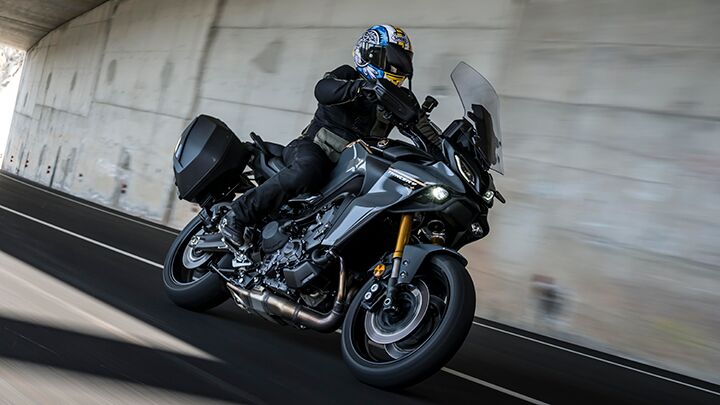










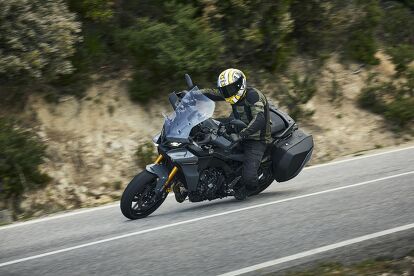
























































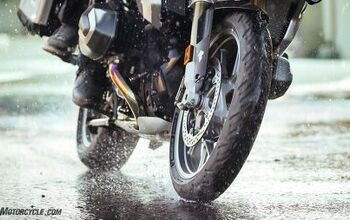
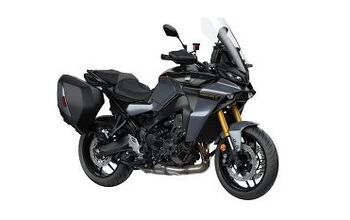
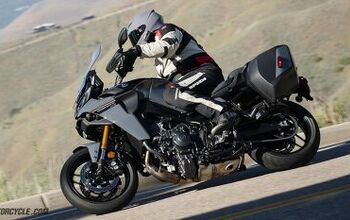
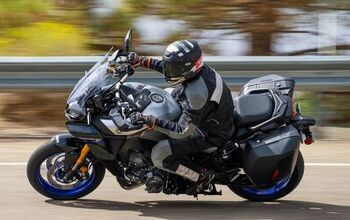
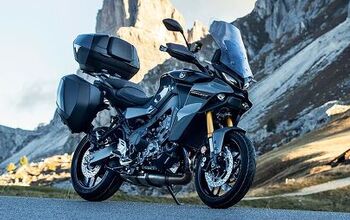
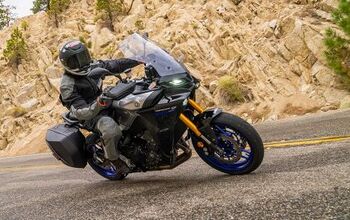




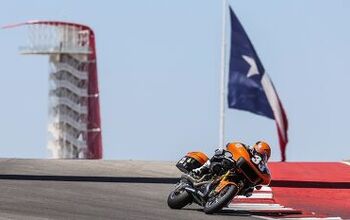
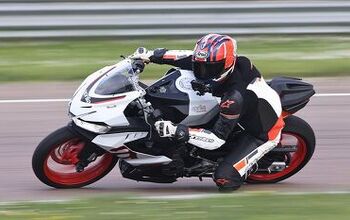

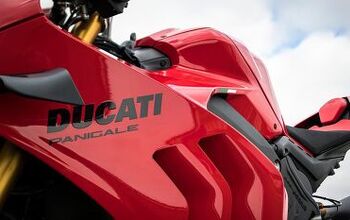
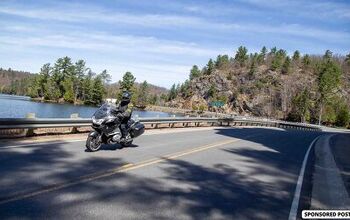

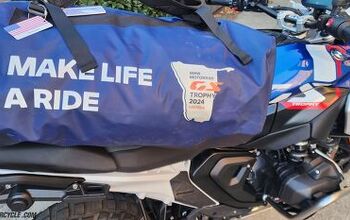
Comments
Join the conversation
What a damn shame! Frigging adaptive cruise and brakes? Way to Ruin what was going to be my next Bike purchase Yamaha!
sounds very tempting... will be test riding, have s1000xr currently, as well as some others to maybe trade, being yamaha, the technology should be all excellent, along with the reliability of the bike! 👍️